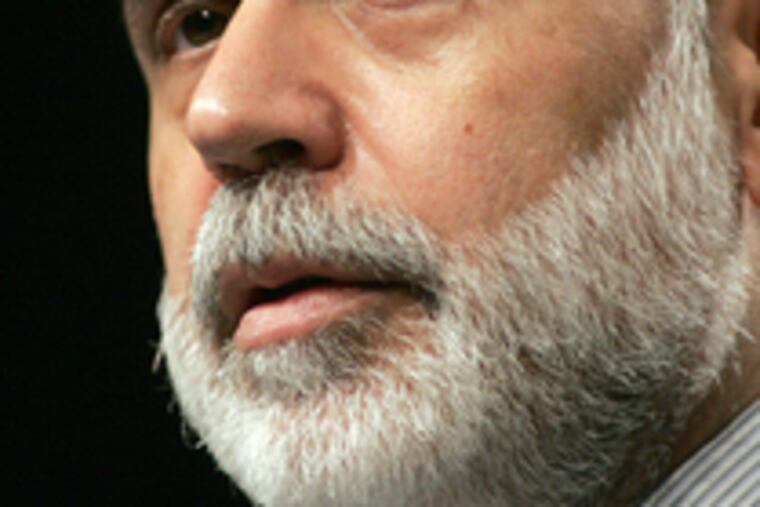
Charles I. Plosser leaves no doubt about where he stands on the dangers of inflation.
"I believe inflation is an insidious tax," said the president of the Federal Reserve Bank of Philadelphia, whose views have made him a dissenter in Washington.
Plosser, 59, has long been a steadfast believer that the central bank's most important job is keeping prices stable. This year, with gasoline costing more than $4 a gallon and food prices rising, his stance is more relevant than ever because he has a voting seat on a Fed committee that sets key interest rates.
Twice, in March and April, Plosser voted against reductions in the Federal Funds target rate because he thought the need to keep inflation in check outweighed the need to further spur the economy through lower interest rates.
Both times, the rate reductions passed.
Plosser's negative votes, which observers said are not easy to make, have put him in the spotlight at a Fed that itself has been on economic center stage for its role in taming the credit crisis.
"On one hand it looks like he's standing out like a sore thumb, but on the other hand, as a new member, it's important that he express his strong views," said James P. Dunigan, executive vice president and chief investment officer at PNC Wealth Management in Philadelphia.
At the next scheduled meeting of the rate-setting Federal Reserve Open Market Committee on June 24 and 25, Plosser is unlikely to have the opportunity to cast a third straight dissenting vote against a rate cut.
Fed chairman Ben S. Bernanke reiterated last week that rate cuts had gone far enough and said that concerns about the weak dollar and inflation had taken a higher priority. "For now, policy seems well-positioned to promote moderate growth and price stability over time," Bernanke said in a speech.
Bernanke and Plosser both have said that the overall average inflation rate of 3.5 percent over the last four quarters is too high. "I am looking for inflation to decrease over the next two years, to close to or below 2 percent by the end of 2009," said Plosser.
The so-called Philly Fed that Plosser heads is one of 12 regional banks set up by the Federal Reserve Act of 1913 "to balance what at the time was the Washington-New York axis of bankers," Plosser said.
One of Plosser's jobs is to keep tabs on the economy in eastern Pennsylvania, southern New Jersey and Delaware. The bank employs nearly 1,000 and has one of the last four paper-check processing operations.
No matter what happens in the economy, Plosser seems unlikely to stop stressing that he sees the Fed's paramount role as controlling inflation through monetary policy, which affects how much money is sloshing around in the economy.
"Fundamentally, the central bank is the only entity that really has responsibility for that, so I feel strongly about it," Plosser said during an interview. "I also feel strongly that the Federal Reserve didn't do a very good job of that in 1970s."
The 1970s are when Plosser was earning his doctorate in economics at the University of Chicago, where the famed monetarist Milton Friedman reigned. The '70s also are where all discussions of the country's current bout with inflation lead.
The common ground is a more-than-quadrupling in the price of crude oil from $3 a barrel in 1972 to $14 a barrel in 1975 and from $30 a barrel in 2003 to nearly $140 now.
Many economists, including Bernanke, take great pains to explain that there are more differences than similarities between the 1970s and now. The economy is more flexible and less energy intensive now, they argue.
The issue for Plosser, who taught MBA students at the University of Rochester before becoming president of the Philadelphia Fed in August 2006, is how the Fed responded.
In the 1970s, he said, the Fed tried to prevent the oil price shock from hurting the economy by making too much money available. That resulted in double-digit inflation and the Fed's loss of credibility as an inflation fighter.
"We had to earn that credibility back, and we suffered through a fairly severe recession in the early 80s" after former Fed chairman Paul A. Volcker sharply raised interest rates.
"Once you've lost that credibility and reputation, it can be costly to earn it back again. I don't want to put the economy through that same ringer to restore that credibility once it's lost," said Plosser.
Some economists think Plosser's resistance to lower interest rates did not make sense this spring.
"The underlying sources of inflation right now, energy and food, are not controllable by Fed policy," said Joel Naroff, chief economist at Commerce Bank. "If the Fed raises rates, people are not going to eat a whole lot less."
Dunigan, the PNC executive, said he was comforted to have someone waving the anti-inflationary flag at the Fed, as long as he did not go overboard with it and "is willing to cede to where the evidence is."
"There could be a lot of pressure, from Congress, or whoever, to stimulate growth, which could easily lead to increasing inflationary pressures," Dunigan said.